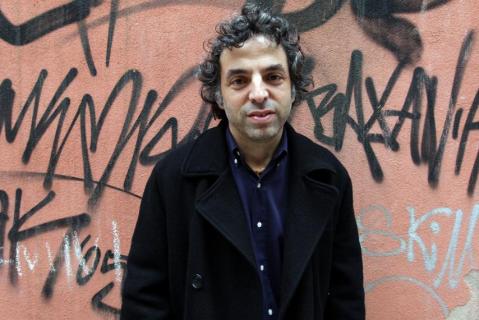
Who is Etgar Keret? His essays and fiction appear in the New Yorker and other august publications; his stories are read on This American Life; he’s won more awards than I can list in a blog post.
But that doesn’t really tell you anything does it?
Well, I thought I’d start by introducing you to the clever beginning of one of Etgar Keret’s stories. But soon I remembered that there are too many clever beginnings to pick just one.
There’s the story that begins, “Killers for hire, they’re like wildflowers.”
Another begins, “Three of the guys she dated tried to commit suicide. She said that sadly but with a little bit of pride too.”
Another: “The man who knew what I was about to say sat next to me on the plane, a stupid smile plastered across his face.”
Another: “I know a guy who fantasizes all the time. I mean, this guy even walks down the street with his eyes shut.”
Not to mention the story that begins, “This story is the best story in the book.”
The other trouble with beginning with a clever beginning is that, if you haven’t read Etgar Keret’s stories, you might think that this is a writer who is only good at clever beginnings. You’ll miss the way his stories (and essays!) swerve unexpectedly; the way they crystallize an entire situation, an entire personality, the absurdity of life itself, in a few rich sentences.
And you’ll also miss the heart in his stories—these unusual, clever stories so full of heart. Go read this one. Or this one.
What else do you need to know, hypothetical person who doesn’t know about Etgar Keret? Keret is an Israeli writer, writing from an Israeli perspective, giving us stories that are not only funny but deep with mystery, paradox, and moral difficulty.
And if you really haven’t read Keret’s stories before, you should also know this: his stories are very short, sometimes just a page or two long.
I will say this about very short stories: in general, lots of people like the idea of very short stories. Very short stories suit the modern attention span! But there’s a problem with very short stories: in general, most of them are terrible. They are extremely difficult to write well. When most writers try to write very short stories, the resulting stories usually aren’t clever, or if they are clever, then they lack heart. If writing very short stories weren’t incredibly hard, everyone would write them.
But Keret, somehow, has mastered the craft of very short stories. And thank God, because then we get to read them.
I had a chance to meet Keret once, in a cafe in Tel Aviv. He was witty, self-deprecating, warm. He told terrific stories. I gave him a book to sign, and he drew a big robot in it. He has a unique perspective on writing, literature, and the world. He knows the secrets to writing a story that will make you laugh then break your heart, in three pages. What I am telling you is this: when he comes to Lighthouse, you really don’t want to miss it.
Editor's note: Etgar Keret will be here for our next Writer's Studio, May 6 & 7. To find out more and get tickets, click here.
Lighthouse instructor Nick Arvin is a graduate of the Iowa Writers' Workshop and the author of three books: In the Electric Eden, Articles of War, and The Reconstructionist. His work has appeared in The New Yorker, New York Times, and Wall Street Journal, and he has been honored with awards from the American Academy of Arts and Letters, the American Library Association, the Isherwood Foundation, and the National Endowment for the Arts.

